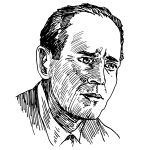In 1957, Alfred Hitchcock cast James Stewart as the lead in Vertigo. You know the story: Scottie Ferguson, an acrophobic detective, falls in love with the woman he’s hired to shadow—the mysterious Madeleine. In thrall to melancholy, she leaps from a bell tower to her death; Scottie, catatonic with guilt, is institutionalized. Months later he spots Judy, a woman who resembles Madeleine; exploiting her neediness, he makes her over in the image of the dead woman—then learns Judy was Madeleine: she’d impersonated her in a (most implausible) murder plot. Enraged, Scottie constructs a climax that allows him to negate his guilt with a cruel act of revenge.
Vertigo’s sensibility was complex, its matter murky—and the casting of its protagonist one of the great mistakes in movie history. James Stewart, an amiable actor of limited resources, was the wrong man to play Scottie. The right man, the only man, would have been Henry Fonda.
It could so easily have happened that way. Fonda had starred in Hitchcock’s previous movie, The Wrong Man (1956), a fact-based chronicle of false arrest. Its coscenarist, Maxwell Anderson, was enlisted to draft the first Vertigo script, from the Boileau-Narcejac novel D’Entre les morts (literally, “From among the Dead”). Initially cast in the dual role of Madeleine/Judy was Vera Miles, Fonda’s costar in The Wrong Man. (Sidelined by pregnancy, she would be replaced by Kim Novak.) Vertigo’s other female lead, Scottie’s gal pal Midge, was played by Barbara Bel Geddes—Fonda’s costar, one year later, in Silent Night, Lonely Night on Broadway.
Coincidences. Show business, we hear, is a small world: these are only the happenstantial hellos of professionals crossing the same stages and studios.
But there are deeper reasons for projecting Fonda onto Vertigo’s scenario of romantic loss and morbid fixation. In 1950, his second wife, the socialite Frances Seymour, who had been in and out of institutions for years, cut her throat in an upstate New York asylum, with a smuggled razor, on her forty-second birthday. On New Year’s Day, 1960, Fonda’s first wife, the actress Margaret Sullavan—like Frances, a probable manic depressive (and erstwhile James Stewart costar)—would be found in a New Haven hotel room, having overdosed on pills. In those years, Fonda was investigating suicide, depression, and alienation in his stage, screen, and television roles (The Petrified Forest, Two for the Seesaw, A Gift of Time). He was speaking from among the dead.
“My life has been peppered with suicides,” Fonda said not long before he died, “and I don’t like to think back on them.”
We risk overestimating the contribution of personal tragedy to an artist’s work: it’s easy to mistake imagined pain for palpable accomplishment. But Fonda transformed one into the other by drawing out emotion on thin, patient wires of speech and movement, by suggesting suffering beneath stoic skin. In The Wrong Man, nightmare was registered almost completely through the star’s physiognomy—his mortified face as a cop emptied his pockets, his eyes peering from within the cell. An austere, unnerving performance, it had seduced from Hitchcock a rare earnestness.
The French didn’t take such things for granted. “Never was Fonda so fine,” François Truffaut wrote, “so grand and noble as in this film where he has only to present his honest man’s face, just barely lit with a sad, an almost transparent expression.” Watching the accused hero commit his unstable wife to an institution—shades of Fonda and Frances—Jean-Luc Godard mused on “the beauty of Henry Fonda’s face,” a face whose “only criterion is the exact truth.”
The “exact truth” of Vertigo is its refusal of restoration—a larger Hitchcockian design that Fonda would have fulfilled as James Stewart did not. The film’s action is not directed, as it “should” be, toward a healthy relief of Scottie’s necrophilic impulse: our hero, we realize, is empty of any passion beyond his knot of fixation and phobia. Without his sickness, he’s a cipher. Hitchcock leads us in trance rhythm toward the consummation of a pathology that is exquisitely, tragically self-destructive. Fonda at his masochistic finest makes devastation charismatic and torment vibrant: he is Scottie incarnate because his face has no faith in restoration, his eyes can’t believe in peace.
Vertigo is called a masterpiece, but it can’t be. Stewart lacks the physical and psychological ingenuity to embody this dreadfully twisted character. Perfect for Rear Window’s humor and shivery suspense, in Vertigo he is a soft center neither projecting nor inspiring fear, his madness a monotonous mimicry. When, at the film’s pivotal point, he sees Judy-as-Madeleine for the first time—bathed in a sickly green neon strobe, she evokes a demon lover risen from the sea—all Stewart can do is stare. And there’s nothing behind the stare. Nothing evil or lustful or agonized, let alone unnameable. Scottie is the demon, but Stewart doesn’t seem to know.
Fonda, conversely, was one of the finest starers we ever had. Superimpose here a remembered Fonda stare: the lethal glare of his fugitive in You Only Live Once; the angry squint of Tom Joad; the gaze of the wrong man upon Jesus as he prays for deliverance. Add to that the insight he would have brought to Scottie as someone who knew loss, suicide, mental wards, morbidity as a vocation, and you touch the dizzying gap between what Vertigo is and what it might have been.
This is all reverie, of course. But fair play: a film that aspires to the qualities of dreaming asks to be recast, reimagined. We’re not wrong for sharing Scottie’s desire to replace one face with another, a stubborn fact with a tantalizing fancy. We might even acknowledge sweet regret when life asserts itself over wish: imperfect reality is only a reminder that, if Hitchcock’s Vertigo belongs to everyone, my Vertigo belongs to me.





